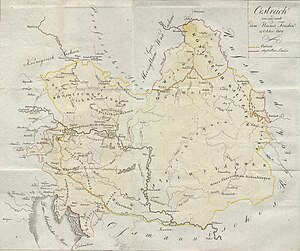Peace of Schönbrunn
The Peace of Schönbrunn was a peace agreement between Napoleon Bonaparte and Franz I of Austria on October 14, 1809 at Schönbrunn Palace . The Austrian Empire had lost the Fifth Coalition War against France , which began on April 9, 1809 .
In this war Austria, inspired by events in Spain , tried to bring about popular uprisings in Germany and Italy against French domination and at the same time sought an alliance with Russia and Prussia in order to reverse the results of the peace agreement in Pressburg . The hopes were all dashed. The uprising of Andreas Hofer against the Bavarian occupiers was finally completely suppressed after initial successes.
The campaign on the main battlefield of southern Germany was unfortunate. Napoleon occupied Vienna as early as May . He was defeated shortly afterwards in the Battle of Aspern , but defeated the Austrians on 5/6. July 1809 in the decisive battle near Wagram . The Znojmo armistice ended the fighting on July 12, 1809 and gave up Tyrol. The main responsible Minister Stadion was replaced by Metternich .
In this peace agreement, Austria renounced Carniola , Trieste , Gorizia , Villach and the coastal area of Croatia ( Hungarian Dalmatia ) and thus lost access to the sea. France annexed these areas, Napoleon formed the Illyrian provinces with the previously royal Italian Dalmatia and Istria . The Duchy of Salzburg fell to Bavaria as the Salzachkreis . Western Galicia and Cracow , the profits of the third partition of Poland , came to the Duchy of Warsaw after a failed campaign . From Galicia , which had been Austrian since the first partition of Poland, the Duchy of Warsaw Zamoscer district and Russia, which had participated in the conflict on the French side with an invasion of Galicia, received the district around Tarnopol ( Tarnopol district ). In addition, Austria renounced the rule of Rhäzün in favor of France and in favor of Saxony the exclaves in Upper Lusatia that had remained with Bohemia after the Peace of Prague of 1635 .
In total, Austria had to cede around 100,000 km² with around 3,500,000 inhabitants. 85 million francs war contribution had to be paid to France. The country had to join the anti-British continental blockade and reduce its army to 150,000 men. The fortress on the Graz Schlossberg , which Hackher zu Hart had defended, had to be razed.
But even after this loss of territory, Austria was a great power with around 600,000 km² and over 24 million inhabitants. Consequences of Metternich's change of course in foreign policy related to the conclusion of peace were Napoleon's marriage to the Austrian Emperor's daughter Marie-Louise and a military alliance that forced Austria to take part in the 1812 Russian campaign.
See also
Web links
- Peace treaty between His Majesty the Emperor of Austria, King of Hungary and Bohemia, and His Majesty the Emperor of the French, King of Italy, Protector of the Rhenish Confederation: concluded at Vienna on October 14th, ratified on both sides on October 17th and 16th , and changed on October 20, 1809
- Entry on the Peace of Schönbrunn in the Austria Forum (in the AEIOU Austria Lexicon )
